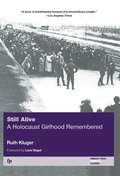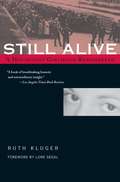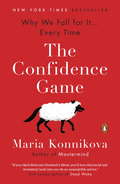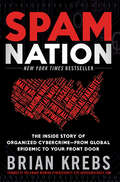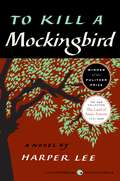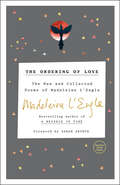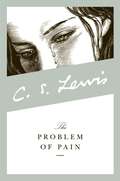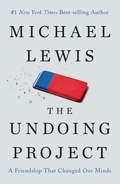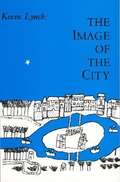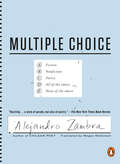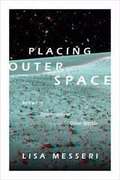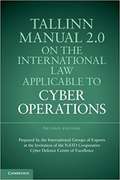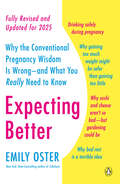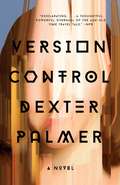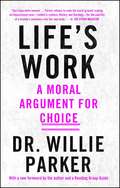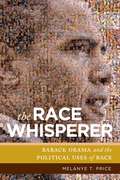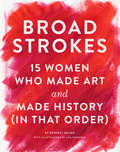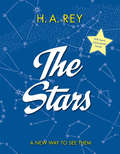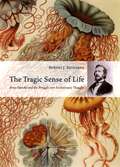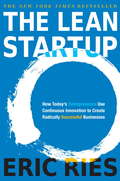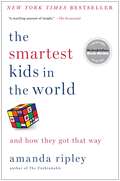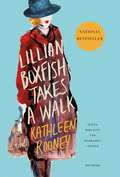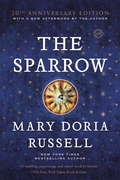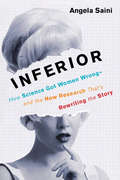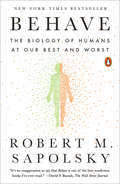Special Collections
Ted.com Recommended Reads
- Table View
- List View
Still Alive
by Ruth KlugerNow in paperback, this European bestseller won huge -acclaim from U. S. critics, Jonathan Yardley of the Washington Post Book World declared this memoir of a Holocaust girlhood and a life reclaimed "one of the best books of 2001 . . . a book of surpassing, and at times brutal, honesty. . . . Among the many reasons that Still Alive is such an important book is its insistence that the full texture of women's existence in the Holocaust be acknowledged. " Ruth Kluger's story of her years in several concentration camps, and her struggle to establish a life after the war as a refugee survivor in New York, has emerged as one of the most powerful accounts of the Holocaust. Still Alive is a memoir of the pursuit of selfhood against all odds, a fiercely bittersweet coming-of-age story in which the protagonist must learn never to rely on comforting assumptions, but always to seek her own truth. "A deeply moving and significant work . . . compared by European critics to the work of Primo Levi and Elie Wiesel. "--Publishers Weekly "A stunning contemplation of human relationships, power and the creation of history. . . . A work of such nuance, intelligence and force that it leaps the bounds of genre. "--Kirkus Reviews Ruth Kluger is professor emerita of German at the University of California, Irvine. She is the author of five books about German literature and the recipient of Austria's National Prize for Literary Criticism. Her widely translated memoir has won eight European Literary awards. Lore Segal's writings include the novels Other People's Houses and Her First American.
Still Alive
by Lore Segal and Ruth KlugerNow in paperback, this European bestseller won huge -acclaim from U.S. critics, Jonathan Yardley of the Washington Post Book World declared this memoir of a Holocaust girlhood and a life reclaimed "one of the best books of 2001 . . . a book of surpassing, and at times brutal, honesty. . . . Among the many reasons that Still Alive is such an important book is its insistence that the full texture of women's existence in the Holocaust be acknowledged."Ruth Kluger's story of her years in several concentration camps, and her struggle to establish a life after the war as a refugee survivor in New York, has emerged as one of the most powerful accounts of the Holocaust. Still Alive is a memoir of the pursuit of selfhood against all odds, a fiercely bittersweet coming-of-age story in which the protagonist must learn never to rely on comforting assumptions, but always to seek her own truth."A deeply moving and significant work . . . compared by European critics to the work of Primo Levi and Elie Wiesel."--Publishers Weekly"A stunning contemplation of human relationships, power and the creation of history. . . . A work of such nuance, intelligence and force that it leaps the bounds of genre."--Kirkus ReviewsRuth Kluger is professor emerita of German at the University of California, Irvine. She is the author of five books about German literature and the recipient of Austria's National Prize for Literary Criticism. Her widely translated memoir has won eight European Literary awards. Lore Segal's writings include the novels Other People's Houses and Her First American.
The Confidence Game
by Maria Konnikova"It’s a startling and disconcerting read that should make you think twice every time a friend of a friend offers you the opportunity of a lifetime.”—Erik Larson, #1 New York Times bestselling author of Dead Wake and bestselling author of Devil in the White CityThink you can’t get conned? Think again. The New York Times bestselling author of Mastermind: How to Think Like Sherlock Holmes explains how to spot the con before they spot you.“[An] excellent study of Con Artists, stories & the human need to believe” –Neil Gaiman, via Twitter A compelling investigation into the minds, motives, and methods of con artists—and the people who fall for their cons over and over again. While cheats and swindlers may be a dime a dozen, true conmen—the Bernie Madoffs, the Jim Bakkers, the Lance Armstrongs—are elegant, outsized personalities, artists of persuasion and exploiters of trust. How do they do it? Why are they successful? And what keeps us falling for it, over and over again? These are the questions that journalist and psychologist Maria Konnikova tackles in her mesmerizing new book. From multimillion-dollar Ponzi schemes to small-time frauds, Konnikova pulls together a selection of fascinating stories to demonstrate what all cons share in common, drawing on scientific, dramatic, and psychological perspectives. Insightful and gripping, the book brings readers into the world of the con, examining the relationship between artist and victim. The Confidence Game asks not only why we believe con artists, but also examines the very act of believing and how our sense of truth can be manipulated by those around us.From the Hardcover edition.
Spam Nation
by Brian KrebsA New York Times bestseller and winner of a 2015 Prose Award!There is a threat lurking online. A secret war with the power to destroy your finances, steal your personal data, and endanger your life.In Spam Nation, investigative journalist and cybersecurity expert Brian Krebs unmasks the criminal masterminds driving some of the biggest spam and hacker operations targeting Americans and their bank accounts. Tracing the rise, fall, and alarming resurrection of the digital mafia behind the two largest spam pharmacies—and countless viruses, phishing, and spyware attacks—he delivers the first definitive narrative of the global spam problem and its threat to consumers everywhere.Blending cutting-edge research, investigative reporting, and firsthand interviews, this terrifying true story reveals how we unwittingly invite these digital thieves into our lives every day. From unassuming computer programmers right next door to digital mobsters like "Cosma"—who unleashed a massive malware attack that has stolen thousands of Americans' logins and passwords—Krebs uncovers the shocking lengths to which these people will go to profit from our data and our wallets.Not only are hundreds of thousands of Americans exposing themselves to fraud and dangerously toxic products from rogue online pharmacies, but even those who never open junk messages are at risk. As Krebs notes, spammers can—and do—hack into accounts through these emails, harvest personal information like usernames and passwords, and sell them on the digital black market. The fallout from this global epidemic doesn't just cost consumers and companies billions, it costs lives too.Fast-paced and utterly gripping, Spam Nation ultimately proposes concrete solutions for protecting ourselves online and stemming this tidal wave of cybercrime—before it's too late."Krebs's talent for exposing the weaknesses in online security has earned him respect in the IT business and loathing among cybercriminals… His track record of scoops...has helped him become the rare blogger who supports himself on the strength of his reputation for hard-nosed reporting." —Bloomberg Businessweek
To Kill a Mockingbird
by Harper LeeLook for The Land of Sweet Forever, a posthumous collection of newly discovered short stories and previously published essays and magazine pieces by Harper Lee, coming October 21, 2025.Voted America's Best-Loved Novel in PBS's The Great American ReadHarper Lee's Pulitzer Prize-winning masterwork of honor and injustice in the deep South—and the heroism of one man in the face of blind and violent hatredOne of the most cherished stories of all time, To Kill a Mockingbird has been translated into more than forty languages, sold more than forty million copies worldwide, served as the basis for an enormously popular motion picture, and was voted one of the best novels of the twentieth century by librarians across the country. A gripping, heart-wrenching, and wholly remarkable tale of coming-of-age in a South poisoned by virulent prejudice, it views a world of great beauty and savage inequities through the eyes of a young girl, as her father—a crusading local lawyer—risks everything to defend a black man unjustly accused of a terrible crime.
The Ordering of Love
by Madeleine L'EnglePraise for The Ordering of LoveBy Madeleine L'Engle"In a brilliant marriage of myth and manner, histories sacred and profane, prayers of petition and of praise, these poems both articulate and illumine the trouble in the gap in which we live-the gap between human affections and Divine Love. L'Engle is unfailing in her willingness to see through-not around-human suffering, and in so doing announces no final severing of spirit and flesh but an enduring vision of resurrection in that crux, in the cross, in the One in Whom all things meet, continuing." -Scott Cairns, author of Slow Pilgrim and Philokalia: New and Selected Poems"I love L'Engle's poetry for the way it incarnates not only the great Truths of the faith, but all the little truths of our ordinary existence-our working and playing and loving and fighting and dreaming and idling and all the rest of it-and for the way it shows us that those big and little truths should not, cannot, be separated."-Carolyn Arends, recording artist and author"Why is L'Engle one of the defining poets of our time? Because when life hurts, she does not shrink from the wounds. She clarifies the murk with hope as we feel the lift of grace."-Calvin Miller, Beeson Divinity SchoolBirmingham, Alabama"We are, all of us, the richer for this carefully crafted and prayerfully rendered collection."-Phyllis Tickle, Author, The Divine Hours"Poetry, at least the kind I write, is written out of immediate need; it is written out of pain, joy, and experience too great to be borne until it is ordered into words. And then it is written to be shared."-Madeleine L'EngleMadeleine L'Engle's writing has always translated the invisible and intricate qualities of love into the patterns and rhythms of visible life. Now, with compelling language and open-hearted vulnerability, The Ordering of Love brings together the exhaustive collection of L'Engle's poetry for the first time. This volume collects nearly 200 of L'Engle's original poems, including eighteen that have never before been published. Reflecting on themes of love, loss, faith, and beauty, The Ordering of Love gives vivid and compelling insight into the language of the heart.From the Hardcover edition.
The Problem of Pain
by C. S. LewisIn The Problem of Pain, C.S. Lewis, one of the most renowned Christian authors and thinkers, examines a universally applicable question within the human condition: "If God is good and all-powerful, why does he allow his creatures to suffer pain?" With his signature wealth of compassion and insight, C.S. Lewis offers answers to these crucial questions and shares his hope and wisdom to help heal a world hungering for a true understanding of human nature.
The Undoing Project
by Michael LewisHow a Nobel Prize-winning theory of the mind altered our perception of reality.
Forty years ago, Israeli psychologists Daniel Kahneman and Amos Tversky wrote a series of breathtakingly original studies undoing our assumptions about the decision-making process. Their papers showed the ways in which the human mind erred, systematically, when forced to make judgments in uncertain situations. Their work created the field of behavioral economics, revolutionized Big Data studies, advanced evidence-based medicine, led to a new approach to government regulation, and made much of Michael Lewis's own work possible. Kahneman and Tversky are more responsible than anybody for the powerful trend to mistrust human intuition and defer to algorithms.
The Undoing Project is about a compelling collaboration between two men who have the dimensions of great literary figures. They became heroes in the university and on the battlefield--both had important careers in the Israeli military--and their research was deeply linked to their extraordinary life experiences. Amos Tversky was a brilliant, self-confident warrior and extrovert, the center of rapt attention in any room; Kahneman, a fugitive from the Nazis in his childhood, was an introvert whose questing self-doubt was the seedbed of his ideas. They became one of the greatest partnerships in the history of science, working together so closely that they couldn't remember whose brain originated which ideas, or who should claim credit. They flipped a coin to decide the lead authorship on the first paper they wrote, and simply alternated thereafter.
This story about the workings of the human mind is explored through the personalities of two fascinating individuals so fundamentally different from each other that they seem unlikely friends or colleagues. In the process they may well have changed, for good, mankind's view of its own mind.
A New York Times Bestseller
The Image of the City
by Kevin LynchWhat does the city's form actually mean to the people who live there? What can the city planner do to make the city's image more vivid and memorable to the city dweller? To answer these questions, Mr. Lynch, supported by studies of Los Angeles, Boston, and Jersey City, formulates a new criterion -- imageability -- and shows its potential value as a guide for the building and rebuilding of cities. The wide scope of this study leads to an original and vital method for the evaluation of city form. The architect, the planner, and certainly the city dweller will all want to read this book.
Multiple Choice
by Alejandro Zambra and Megan McdowellNAMED ONE OF THE BEST BOOKS OF THE SUMMER BY THE WALL STREET JOURNAL, ELLE, THE HUFFINGTON POST, THE MILLIONS, VOX, BBC, AND PUREWOW"Latin America's new literary star." --The New Yorker"Brilliant . . . Like a literary exercise for the mind, but strangely fun to decode." --Elle"The most talked-about writer to come out of Chile since Bolaño," (The New York Times Book Review), Alejandro Zambra is celebrated around the world for his strikingly original, slyly funny, daringly unconventional fiction. Now, at the height of his powers, Zambra returns with his most audaciously brilliant book yet.Written in the form of a standardized test, Multiple Choice invites the reader to respond to virtuoso language exercises and short narrative passages through multiple-choice questions that are thought-provoking, usually unanswerable, and often absurd. It offers a new kind of reading experience, one in which the reader participates directly in the creation of meaning, and the nature of storytelling itself is called into question. At once funny, poignant, and political, Multiple Choice is about love and family, authoritarianism and its legacies, and the conviction that, rather than learning to think for ourselves, we are trained to obey and repeat. Serious in its literary ambition and playful in its execution, it confirms Alejandro Zambra as one of the most important writers working in any language.From the Trade Paperback edition.
Placing Outer Space
by Lisa MesseriIn Placing Outer Space Lisa Messeri traces how the place-making practices of planetary scientists transform the void of space into a cosmos filled with worlds that can be known and explored. Making planets into places is central to the daily practices and professional identities of the astronomers, geologists, and computer scientists Messeri studies. She takes readers to the Mars Desert Research Station and a NASA research center to discuss ways scientists experience and map Mars. At a Chilean observatory and in MIT's labs she describes how they discover exoplanets and envision what it would be like to inhabit them. Today's planetary science reveals the universe as densely inhabited by evocative worlds, which in turn tells us more about Earth, ourselves, and our place in the universe.
Tallinn Manual 2.0 on the International Law Applicable to Cyber Operations
by Schmitt and Michael N.Tallinn Manual 2. 0 expands on the highly influential first edition by extending its coverage of the international law governing cyber operations to peacetime legal regimes. The product of a three-year follow-on project by a new group of twenty renowned international law experts, it addresses such topics as sovereignty, state responsibility, human rights, and the law of air, space, and the sea. Tallinn Manual 2. 0 identifies 154 'black letter' rules governing cyber operations and provides extensive commentary on each rule. Although Tallinn Manual 2. 0 represents the views of the experts in their personal capacity, the project benefitted from the unofficial input of many states and over fifty peer reviewers.
Expecting Better: Why the Conventional Pregnancy Wisdom Is Wrong--and What You Really Need to Know
by Emily OsterWhat to Expect When You're Expecting meets Freakonomics: an award-winning economist disproves standard recommendations about pregnancy to empower women while they're expecting Pregnancyunquestionably one of the most profound, meaningful experiences of adulthoodcan reduce otherwise intelligent women to, well, babies. We’re told to avoid cold cuts, sushi, alcohol, and coffee, but aren’t told why these are forbidden. Rules for prenatal testing are hard and fastand unexplained. Are these recommendations even correct? Are all of them right for every mom-to-be? In Expecting Better, award-winning economist Emily Oster proves that pregnancy rules are often misguided and sometimes flat-out wrong. A mom-to-be herself, Oster debunks the myths of pregnancy using her particular mode of critical thinking: economics, the study of how we get what we want. Oster knows that the value of anythinga home, an amniocentesisis in the eyes of the informed beholder, and like any complicated endeavor, pregnancy is not a one-size-fits-all affair. And yet medicine often treats it as such. Are doctors working from bad data? Are well-meaning friends and family perpetuating false myths and raising unfounded concerns? Oster’s answer is yes, and often. Pregnant women face an endless stream of decisions, from the casual (Can I eat this?) to the frightening (Is it worth risking a miscarriage to test for genetic defects?). Expecting Better presents the hard facts and real-world advice you’ll never get at the doctor’s office or in the existing literature. Oster’s revelatory work identifies everything from the real effects of caffeine and tobacco to the surprising dangers of gardening. Any expectant mother knows that the health of her baby is paramount, but she will be less anxious and better able to enjoy a healthy pregnancy if she is informed . . . and can have the occasional glass of wine. * * * Numbers are not subject to someone else’s interpretationmath doesn’t lie. Expectant economist Emily Oster set out to inform parents-to-be about the truth of pregnancy using the most up-to-date data so that they can make the best decisions for their pregnancies. The results she found were often very surprising · It’s fine to have the occasional glass of wine even one every day in the second and third trimesters. · There is nothing to fear from sushi, but do stay away from raw milk cheese. · Sardines and herring are the fish of choice to give your child those few extra IQ points. · There is no evidence that bed rest is helpful in preventing or treating any complications of pregnancy. · Many unnecessary labor inductions could be avoided by simply staying hydrated. · Epidurals are great for pain relief and fine for your baby, but they do carry some risks for mom. · Limiting women to ice chips during labor is an antiquated practice; you should at least be able to sneak in some Gatorade. · You shouldn’t worry about dyeing your hair or cleaning the cat’s litter box, but gardening while pregnant can actually be risky. · Hot tubs, hot baths, hot yoga: avoid (at least during the first trimester). · You should be more worried about gaining too little weight during pregnancy than gaining too much. · Most exercise during pregnancy is fine (no rock climbing!), but there isn’t much evidence that it has benefits. Except for exercising your pelvic floor with Kegels: that you should be doing. · Your eggs do not have a 35-year-old sell-by date: plenty of women get pregnant after 35 and there is no sudden drop in fertility on your birthday. · Miscarriage risks from tests like the CVS and Amniocentesis are far lower than cited by most doctors. · Pregnancy nausea may be unpleasant, but it’s a good sign: women who are sick are less likely to miscarry. .
Version Control
by Dexter PalmerThe acclaimed author of The Dream of Perpetual Motion returns with a compelling novel about the effects of science and technology on our friendships, our love lives, and our sense of self. Rebecca Wright has reclaimed her life, finding her way out of her grief and depression following a personal tragedy years ago. She spends her days working in customer support for the internet dating site where she first met her husband. But she has a strange, persistent sense that everything around her is somewhat off-kilter: she constantly feels as if she has walked into a room and forgotten what she intended to do there; on TV, the President seems to be the wrong person in the wrong place; her dreams are full of disquiet. Meanwhile, her husband's decade-long dedication to his invention, the causality violation device (which he would greatly prefer you not call a "time machine") has effectively stalled his career and made him a laughingstock in the physics community. But he may be closer to success than either of them knows or can possibly imagine. Version Control is about a possible near future, but it's also about the way we live now. It's about smart phones and self-driving cars and what we believe about the people we meet on the Internet. It's about a couple, Rebecca and Philip, who have experienced a tragedy, and about how they help--and fail to help--each other through it. Emotionally powerful and stunningly visionary, Version Control will alter the way you see your future and your present.From the Hardcover edition.
Life's Work
by Dr Willie ParkerIn Life’s Work, an outspoken, Christian reproductive justice advocate and abortion provider (one of the few doctors to provide such services to women in Mississippi and Alabama) pulls from his personal and professional journeys as well as the scientific training he received as a doctor to reveal how he came to believe, unequivocally, that helping women in need, without judgment, is precisely the Christian thing to do.Dr. Willie Parker grew up in the Deep South, lived in a Christian household, and converted to an even more fundamentalist form of Christianity as a young man. But upon reading an interpretation of the Good Samaritan in a sermon by Dr. Martin Luther King, Jr., he realized that in order to be a true Christian, he must show compassion for all women regardless of their needs. In 2009, he stopped practicing obstetrics to focus entirely on providing safe abortions for the women who need help the most—often women in poverty and women of color—and in the hot bed of the pro-choice debate: the South. He soon thereafter traded in his private practice and his penthouse apartment in Hawaii for the life of an itinerant abortion provider, focusing most recently on women in the Deep South. In Life’s Work, Dr. Willie Parker tells a deeply personal and thought-provoking narrative that illuminates the complex societal, political, religious, and personal realities of abortion in the United States from the unique perspective of someone who performs them and defends the right to do so every day. He also looks at how a new wave of anti-abortion activism, aimed at making incremental changes in laws and regulations state by state, are slowly chipping away at the rights of women to control their own lives. In revealing his daily battle against mandatory waiting periods and bogus rules governing the width of hallways, Dr. Parker uncovers the growing number of strings attached to the right to choose and makes a powerful Christian case for championing reproductive rights.
The Race Whisperer
by Melanye T PriceNearly a week after George Zimmerman was found not guilty of killing Trayvon Martin, President Obama walked into the press briefing room and shocked observers by saying that “Trayvon could have been me.” He talked personally and poignantly about his experiences and pointed to intra-racial violence as equally serious and precarious for black boys. He offered no sweeping policy changes or legislative agendas; he saw them as futile. Instead, he suggested that prejudice would be eliminated through collective efforts to help black males and for everyone to reflect on their own prejudices. Obama’s presidency provides a unique opportunity to engage in a discussion about race and politics. In The Race Whisperer, Melanye Price analyzes the manner in which Barack Obama uses race strategically to engage with and win the loyalty of potential supporters. This book uses examples from Obama’s campaigns and presidency to demonstrate his ability to authentically tap into notions of blackness and whiteness to appeal to particular constituencies. By tailoring his unorthodox personal narrative to emphasize those parts of it that most resonate with a specific racial group, he targets his message effectively to that audience, shoring up electoral and governing support. The book also considers the impact of Obama’s use of race on the ongoing quest for black political empowerment. Unfortunately, racial advocacy for African Americans has been made more difficult because of the intense scrutiny of Obama’s relationship with the black community, Obama’s unwillingness to be more publicly vocal in light of that scrutiny, and the black community’s reluctance to use traditional protest and advocacy methods on a black president. Ultimately, though, The Race Whisperer argues for a more complex reading of race in the age of Obama, breaking new ground in the study of race and politics, public opinion, and political campaigns.
Broad Strokes
by Bridget QuinnHistorically, major women artists have been excluded from the mainstream art canon. Aligned with the resurgence of feminism in pop culture, Broad Strokes offers an entertaining corrective to that omission. Art historian Bridget Quinn delves into the lives and careers of 15 female artists from around the globe in text that's smart, feisty, educational, and an enjoyable read. Replete with beautiful reproductions of the artists' works and contemporary portraits of each artist by renowned illustrator Lisa Congdon, this is art history from the Renaissance to Abstract Expressionism for the modern art lover, reader, and feminist.
The Stars
by H. A. ReyThis is a clear, vivid text with charts and maps showing the positions of the constellations the year round.
The Tragic Sense of Life
by Robert J. RichardsA biography of the controversial German evolutionist Ernst Haeckel (1834-1919)
The Lean Startup
by Eric RiesMost startups fail. But many of those failures are preventable. The Lean Startup is a new approach being adopted across the globe, changing the way companies are built and new products are launched. Eric Ries defines a startup as an organization dedicated to creating something new under conditions of extreme uncertainty. This is just as true for one person in a garage or a group of seasoned professionals in a Fortune 500 boardroom. What they have in common is a mission to penetrate that fog of uncertainty to discover a successful path to a sustainable business. The Lean Startup approach fosters companies that are both more capital efficient and that leverage human creativity more effectively. Inspired by lessons from lean manufacturing, it relies on “validated learning,” rapid scientific experimentation, as well as a number of counter-intuitive practices that shorten product development cycles, measure actual progress without resorting to vanity metrics, and learn what customers really want. It enables a company to shift directions with agility, altering plans inch by inch, minute by minute. Rather than wasting time creating elaborate business plans, The Lean Startup offers entrepreneurs - in companies of all sizes - a way to test their vision continuously, to adapt and adjust before it’s too late. Ries provides a scientific approach to creating and managing successful startups in a age when companies need to innovate more than ever.
The Smartest Kids in the World
by Amanda RipleyHow do other countries create &“smarter&” kids? What is it like to be a child in the world&’s new education superpowers? The Smartest Kids in the World &“gets well beneath the glossy surfaces of these foreign cultures and manages to make our own culture look newly strange....The question is whether the startling perspective provided by this masterly book can also generate the will to make changes&” (The New York Times Book Review).In a handful of nations, virtually all children are learning to make complex arguments and solve problems they’ve never seen before. They are learning to think, in other words, and to thrive in the modern economy. Inspired to find answers for our own children, author and Time magazine journalist Amanda Ripley follows three Americans embedded in these countries for one year. Kim, fifteen, raises $10,000 so she can move from Oklahoma to Finland; Eric, eighteen, trades his high-achieving Minnesota suburb for a booming city in South Korea; and Tom, seventeen, leaves a historic Pennsylvania village for Poland. Through these young informants, Ripley meets battle-scarred reformers, sleep-deprived zombie students, and a teacher who earns $4 million a year. Their stories, along with groundbreaking research into learning in other cultures, reveal a pattern of startling transformation: none of these countries had many “smart” kids a few decades ago. Things had changed. Teaching had become more rigorous; parents had focused on things that mattered; and children had bought into the promise of education.
Lillian Boxfish Takes a Walk
by Kathleen RooneyNOW A NATIONAL INDIE BESTSELLER“Transporting…witty, poignant and sparkling.”—People (People Picks Book of the Week)“Prescient and quick....A perfect fusing of subject and writer, idea and ideal.”—Chicago Tribune“Extraordinary…hilarious…Elegantly written, Rooney creates a glorious paean to a distant literary life and time—and an unabashed celebration of human connections that bridge past and future.—Publishers Weekly (starred and boxed)"Rooney's delectably theatrical fictionalization is laced with strands of tart poetry and emulates the dark sparkle of Dorothy Parker, Edna St. Vincent Millay, and Truman Capote. Effervescent with verve, wit, and heart, Rooney’s nimble novel celebrates insouciance, creativity, chance, and valor."—Booklist (starred review)“In my reckless and undiscouraged youth,” Lillian Boxfish writes, “I worked in a walnut-paneled office thirteen floors above West Thirty-Fifth Street…” She took 1930s New York by storm, working her way up writing copy for R.H. Macy’s to become the highest paid advertising woman in the country. It was a job that, she says, “in some ways saved my life, and in other ways ruined it.”Now it’s the last night of 1984 and Lillian, 85 years old but just as sharp and savvy as ever, is on her way to a party. It’s chilly enough out for her mink coat and Manhattan is grittier now—her son keeps warning her about a subway vigilante on the prowl—but the quick-tongued poetess has never been one to scare easily. On a walk that takes her over 10 miles around the city, she meets bartenders, bodega clerks, security guards, criminals, children, parents, and parents-to-be, while reviewing a life of excitement and adversity, passion and heartbreak, illuminating all the ways New York has changed—and has not. A love letter to city life in all its guts and grandeur, Lillian Boxfish Takes a Walk by Kathleen Rooney paints a portrait of a remarkable woman across the canvas of a changing America: from the Jazz Age to the onset of the AIDS epidemic; the Great Depression to the birth of hip-hop.Lillian figures she might as well take her time. For now, after all, the night is still young.
The Sparrow
by Mary Doria RussellA visionary work that combines speculative fiction with deep philosophical inquiry, The Sparrow tells the story of a charismatic Jesuit priest and linguist, Emilio Sandoz, who leads a scientific mission entrusted with a profound task: to make first contact with intelligent extraterrestrial life. The mission begins in faith, hope, and beauty, but a series of small misunderstandings brings it to a catastrophic end. Praise for The Sparrow "A startling, engrossing, and moral work of fiction."--The New York Times Book Review "Important novels leave deep cracks in our beliefs, our prejudices, and our blinders. The Sparrow is one of them."--Entertainment Weekly "Powerful . . . The Sparrow tackles a difficult subject with grace and intelligence."--San Francisco Chronicle "Provocative, challenging . . . recalls both Arthur C. Clarke and H. G. Wells, with a dash of Ray Bradbury for good measure."--The Dallas Morning News "[Mary Doria] Russell shows herself to be a skillful storyteller who subtly and expertly builds suspense."--USA TodayFrom the Trade Paperback edition.
Inferior
by Angela SainiWhat science has gotten so shamefully wrong about women, and the fight, by both female and male scientists, to rewrite what we thought we knewFor hundreds of years it was common sense: women were the inferior sex. Their bodies were weaker, their minds feebler, their role subservient. No less a scientist than Charles Darwin asserted that women were at a lower stage of evolution, and for decades, scientists—most of them male, of course—claimed to find evidence to support this.Whether looking at intelligence or emotion, cognition or behavior, science has continued to tell us that men and women are fundamentally different. Biologists claim that women are better suited to raising families or are, more gently, uniquely empathetic. Men, on the other hand, continue to be described as excelling at tasks that require logic, spatial reasoning, and motor skills. But a huge wave of research is now revealing an alternative version of what we thought we knew. The new woman revealed by this scientific data is as strong, strategic, and smart as anyone else.In Inferior, acclaimed science writer Angela Saini weaves together a fascinating—and sorely necessary—new science of women. As Saini takes readers on a journey to uncover science’s failure to understand women, she finds that we’re still living with the legacy of an establishment that’s just beginning to recover from centuries of entrenched exclusion and prejudice. Sexist assumptions are stubbornly persistent: even in recent years, researchers have insisted that women are choosy and monogamous while men are naturally promiscuous, or that the way men’s and women’s brains are wired confirms long-discredited gender stereotypes.As Saini reveals, however, groundbreaking research is finally rediscovering women’s bodies and minds. Inferior investigates the gender wars in biology, psychology, and anthropology, and delves into cutting-edge scientific studies to uncover a fascinating new portrait of women’s brains, bodies, and role in human evolution.
Behave
by Robert M. SapolskyWhy do we do the things we do?Over a decade in the making, this game-changing book is Robert Sapolsky's genre-shattering attempt to answer that question as fully as perhaps only he could, looking at it from every angle. Sapolsky's storytelling concept is delightful but it also has a powerful intrinsic logic: he starts by looking at the factors that bear on a person's reaction in the precise moment a behavior occurs, and then hops back in time from there, in stages, ultimately ending up at the deep history of our species and its genetic inheritance.And so the first category of explanation is the neurobiological one. What goes on in a person's brain a second before the behavior happens? Then he pulls out to a slightly larger field of vision, a little earlier in time: What sight, sound, or smell triggers the nervous system to produce that behavior? And then, what hormones act hours to days earlier to change how responsive that individual is to the stimuli which trigger the nervous system? By now, he has increased our field of vision so that we are thinking about neurobiology and the sensory world of our environment and endocrinology in trying to explain what happened.Sapolsky keeps going--next to what features of the environment affected that person's brain, and then back to the childhood of the individual, and then to their genetic makeup. Finally, he expands the view to encompass factors larger than that one individual. How culture has shaped that individual's group, what ecological factors helped shape that culture, and on and on, back to evolutionary factors thousands and even millions of years old.The result is one of the most dazzling tours de horizon of the science of human behavior ever attempted, a majestic synthesis that harvests cutting-edge research across a range of disciplines to provide a subtle and nuanced perspective on why we ultimately do the things we do...for good and for ill. Sapolsky builds on this understanding to wrestle with some of our deepest and thorniest questions relating to tribalism and xenophobia, hierarchy and competition, morality and free will, and war and peace. Wise, humane, often very funny, Behave is a towering achievement, powerfully humanizing, and downright heroic in its own right.
